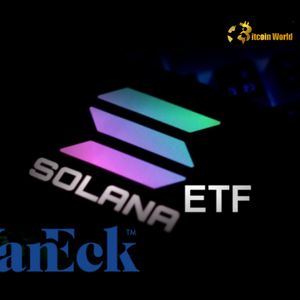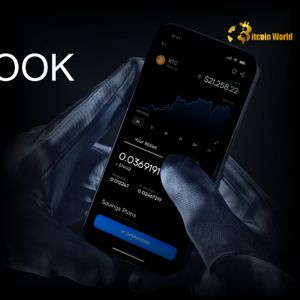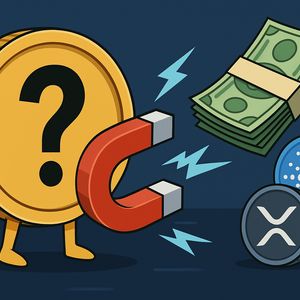BitcoinWorld Solana ETF Hope: VanEck Registers with DTCC Signaling Future Spot SOL ETF Ambitions Big news is circulating in the cryptocurrency investment world. Asset management giant VanEck has taken a notable step regarding a potential Solana ETF . According to reports, VanEck has registered a proposed spot Solana ETF with the Depository Trust & Clearing Corporation (DTCC) under the ticker symbol “VSOL.” This development, while procedural, signals growing institutional interest in offering investment products tied directly to the price of Solana (SOL). What Does DTCC Registration Mean for a Spot Solana ETF? It is crucial to understand the significance, or lack thereof, of a DTCC registration in the context of launching a new financial product like a Spot Solana ETF . The DTCC is a critical piece of market infrastructure, providing clearing and settlement services for securities transactions. Registering a ticker symbol with the DTCC is a necessary administrative step in the process of potentially listing an ETF. It involves setting up the infrastructure for clearing and settling trades should the ETF eventually launch. However, this registration is entirely separate from the regulatory approval process required by the Securities and Exchange Commission (SEC) in the United States. Registering with the DTCC does not mean the ETF is approved for trading, nor does it guarantee that the SEC will eventually approve it for listing on an exchange. Think of it as getting the plumbing ready before the building permits are approved. Why is VanEck Pursuing a SOL ETF? VanEck is a prominent player in the asset management space with a history of being at the forefront of digital asset investment products. They were among the first to file for a Bitcoin ETF and have launched other crypto-related funds. Their move to register a VanEck Solana ETF suggests a belief in Solana’s potential as an investable asset class. Several factors likely contribute to this interest: Solana’s Market Position: Solana (SOL) has emerged as one of the largest and most widely adopted cryptocurrencies by market capitalization and ecosystem activity, particularly in areas like DeFi, NFTs, and gaming. Investor Demand: There is growing investor demand for regulated and easily accessible ways to gain exposure to cryptocurrencies beyond just Bitcoin and Ethereum. A SOL ETF could cater to this demand. Diversification: For investors building a diversified digital asset portfolio, Solana represents a distinct blockchain architecture and ecosystem compared to Bitcoin or Ethereum, offering diversification potential. Following the Trend: The successful launch of spot Bitcoin ETFs in the U.S. has opened the door and set a precedent for other single-asset crypto ETFs. Asset managers are now exploring the next potential candidates. Comparing the VanEck Solana ETF Effort to Bitcoin and Ethereum ETFs The path for a VanEck Solana ETF faces similar, and perhaps unique, hurdles compared to Bitcoin and Ethereum ETFs. The SEC has historically been hesitant to approve spot crypto ETFs, citing concerns about market manipulation and investor protection. The approval of spot Bitcoin ETFs in January 2024 marked a significant shift, largely attributed to the market’s maturity and surveillance sharing agreements. Ethereum’s path to a spot ETF is currently being navigated, with the SEC approving 19b-4 filings for several Ethereum ETFs in May 2024, though S-1 registration statements still require approval before trading can begin. Solana, while large, is still considered by some regulators to be potentially more centralized or less seasoned than Bitcoin or Ethereum. A key factor for SEC approval is often whether the underlying asset’s market is deemed sufficiently resistant to manipulation and if there is a regulated market of significant size for the asset. For a Spot Solana ETF , the SEC will scrutinize the spot market for SOL and its correlation with regulated futures markets (if any exist or become significant). What are the Potential Benefits of a Spot SOL ETF? If a SOL ETF were to gain SEC approval and launch, it could offer several advantages for investors: Accessibility: ETFs trade on traditional stock exchanges, making it easy for retail and institutional investors to gain exposure to Solana through standard brokerage accounts, without needing to set up crypto wallets or navigate complex exchanges. Regulation and Oversight: ETFs are regulated financial products, offering investors protections that may not be present when buying SOL directly on unregulated crypto platforms. Liquidity: ETFs typically offer high liquidity, allowing investors to buy and sell shares easily throughout the trading day. Familiarity: Many traditional investors are comfortable with the ETF structure, making it a more familiar and less intimidating way to invest in a novel asset like Solana. Challenges and the Road Ahead for a Crypto ETF Like Solana’s Despite the DTCC registration, the path to launching a Crypto ETF for Solana is fraught with challenges. The primary hurdle remains obtaining approval from the SEC. The SEC has not yet classified SOL definitively, and its regulatory stance on altcoins other than Bitcoin and Ethereum is less clear. Concerns about Solana’s network stability, past outages, and its token distribution could also be points of regulatory scrutiny. The timeline for potential SEC approval for a Spot Solana ETF is highly uncertain. It could take months or even years, depending on the SEC’s evolving stance on digital assets and specific concerns related to Solana. The process involves detailed filings, public comment periods, and extensive dialogue between the asset manager and the regulator. Actionable Insights for Investors For investors watching the development of a potential VanEck Solana ETF : Stay Informed: Follow official announcements from VanEck and the SEC regarding the filing status. Understand the Process: Recognize that DTCC registration is just one early administrative step and not an indicator of impending SEC approval. Assess Solana Itself: Any investment in a Solana ETF is fundamentally an investment in Solana. Understand the technology, ecosystem, risks, and market dynamics of SOL itself. Consider Alternatives (for now): Until a spot ETF is approved, investors can gain exposure to SOL through direct purchase on exchanges or potentially through regulated trusts or futures-based products if available, understanding the differences and risks involved with each method. Conclusion: A Glimpse into the Future of Crypto Investment VanEck’s DTCC registration for a proposed Solana ETF is a significant administrative step that highlights the growing institutional interest in bringing regulated investment products for major cryptocurrencies to market. While it does not guarantee SEC approval, it signals that asset managers are actively preparing for a future where a Spot Solana ETF could become a reality. The journey for a SOL ETF will likely be challenging, requiring navigation of regulatory hurdles and demonstrating market maturity to the satisfaction of the SEC. Nevertheless, this move by VanEck is a positive indicator for the broader acceptance and accessibility of Solana as an asset class, potentially paving the way for more diverse Crypto ETF offerings in the future. To learn more about the latest crypto ETF trends, explore our article on key developments shaping cryptocurrency institutional adoption. This post Solana ETF Hope: VanEck Registers with DTCC Signaling Future Spot SOL ETF Ambitions first appeared on BitcoinWorld and is written by Editorial Team



















